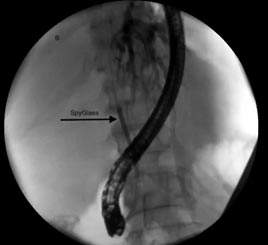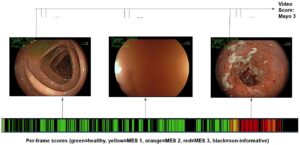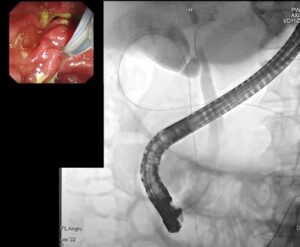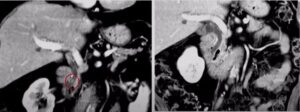AI for ERCP
ERCP biopsies and treatment – challenges
Endoscopic retrograde cholangiopancreatography (ERCP) is an intricate procedure for assessing and treating problems in the biliary ductal system. ERCP is an intricate procedure that involves both endoscopy and fluoroscopy of a region with limited access. Accordingly, it poses several challenges for the gastroenterologist performing the procedure:
- Navigation – Navigation is key during ERCP. Accessing the bile duct is a risky but crucial step not only for introducing the contrast agent but also for performing sphincterotomies or any further navigation to blocked regions of interest.
- Biopsy – once the challenge of accessing the region is overcome, a biopsy is performed in order to assess the blockage. A wide variety of tools may be used in order to break down and sample the blockage (balloons, stents, etc.). The sample must then be examined and further classified as either a benign blockage or a graded tumor.
- Treatment – once the region of interest is reached, the best treatment must be chosen and implemented. Most commonly, the treatment involves either ablation or insertion of stents.

Imaging and artificial intelligence in ERCP
These challenges may be addressed and resolved using advanced methods for image analysis and artificial intelligence. Here is how AI for ERCP can work:
- 3D reconstruction – reconstructing multiangle 2D X-ray images into a 3D image will help gastroenterologists in real-time navigation to the ampulla of Vater. Multiangle ultrasound slices can also be used for 3D reconstruction and assessment of the blockage location and type. Gaining a better visual assessment of the blockage may also assist in selection of the best tools and methods for treating the blockage.
Use of 3D reconstruction will not only increase success and save time, but also reduce any complications involved in the navigation process.
- Tumor classification – since blockages can be caused by a variety of reasons, accurately assessing them is vital in choosing the best course of treatment. Once the biopsy is performed, deep learning and machine learning methods can be trained to accurately classify the tumor as cancerous (of different types and grades) or noncancerous (inflammation, stones or sclerosing).
RSIP Vision and AI for ERCP procedures
RSIP Vision’s proven record in image analysis and AI can assist the gastroenterologist in the complex ERCP procedure, allowing for better access and treatment of any blockage. RSIP Vision has extensive experience in the fields of both 3D reconstruction of images for interventional procedures, as well as classification of tumors using deep learning and advanced segmentation and processing methods.
The result will be a smoother and more efficient ERCP procedure thanks to AI, with fewer complications, and better overall treatment for the patient.

 Gastro
Gastro


